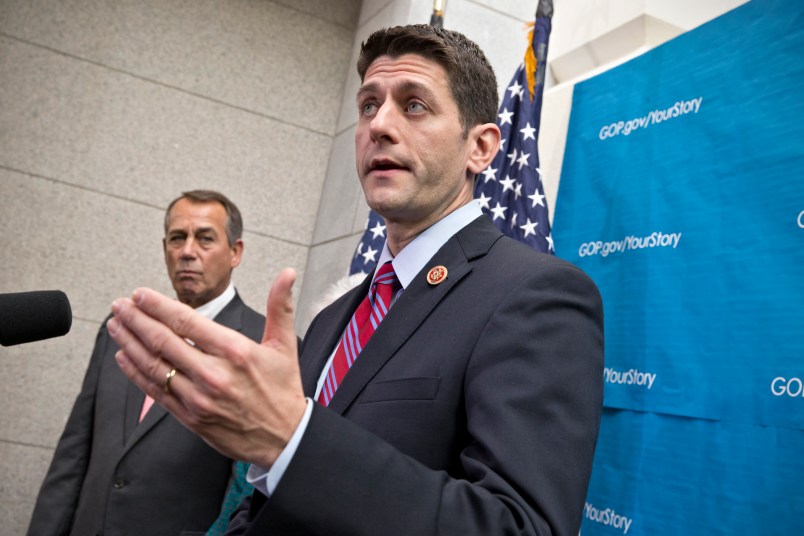The new Republican budget will adopt cuts to Medicare under Obamacare that the party is attacking Democrats for ahead of the 2014 congressional elections.
And it won’t include cuts to Social Security that Republicans bashed President Barack Obama for omitting from his budget proposal just six weeks ago.
The blueprint, to be unveiled Tuesday by House Budget Chair Paul Ryan (R-WI), will shine a light on stark contradictions in the GOP’s stance on these two programs. Slashing the retirement safety net is an overarching goal for wealthy donors and party elites, but their elderly voting base strongly opposes any cuts. While Republicans warn of a looming debt crisis if Medicare and Social Security aren’t scaled back, they’re knocking Democrats for Obamacare’s $700 billion in Medicare payment cuts to hospitals, private insurers and other providers.
“We write to express deep concern about the impact of the cuts imposed by your health care law on the Medicare Advantage (MA) program,” Speaker John Boehner (R-OH) and five top Republicans wrote to Obama in February. They warned that the cuts “will force millions of American seniors to face higher health care costs or lose access to their doctor, health plan, lifesaving drugs, and the benefits they’ve come to rely on.”
The new Ryan budget (which may pass the House but not the Senate) assumes the exact same Medicare cuts as Obamacare over 10 years, and uses the savings to meet its fiscal targets. And it leaves Social Security untouched, even though Boehner’s office tore into Obama in February after the president rescinded his support for a policy known as Chained CPI, which would reduce future benefits by indexing Social Security (and other programs) to a lower rate of inflation.
“This reaffirms what has become all too apparent: the president has no interest in doing anything, even modest, to address our looming debt crisis,” Brendan Buck, a spokesman for Boehner, said at the time. “The one and only idea the president has to offer is even more job-destroying tax hikes, and that non-starter won’t do anything to save the entitlement programs that are critical to so many Americans. With three years left in office, it seems the president is already throwing in the towel.”
Obama included Chained CPI in his budget proposal released in 2013 as an olive branch to Republicans, then rescinded it in 2014 after they refused to give on taxes. But the same policy that the Speaker’s office described as a “modest” step to averting a debt crisis and “sav[ing]” Social Security turns out to have been a bridge too far for the GOP’s official fiscal blueprint. Republicans are unwilling to jeopardize their standing with seniors, which they’d risk doing if they openly endorse cuts to Social Security ahead of a promising election.
When it comes to Medicare, the Ryan budget preserves the program in its existing form for 10 years, and then converts it into an insurance exchange where seniors can use government vouchers to select between a menu of private plans and a public option. That reflects a mix of policy preferences (the GOP desire to unwind the single-payer program) and political considerations (voters younger than 55 are less essential to the Republican base).
It shows how deeply torn the GOP is between election-year politicking and its actual policy priorities. Complicating matters is that both considerations are so strong that Republicans have a hard time choosing between them.






